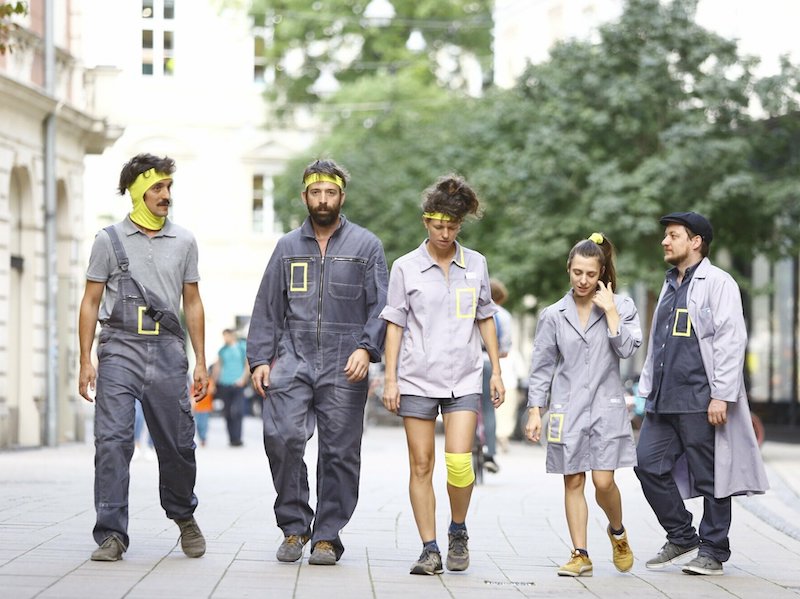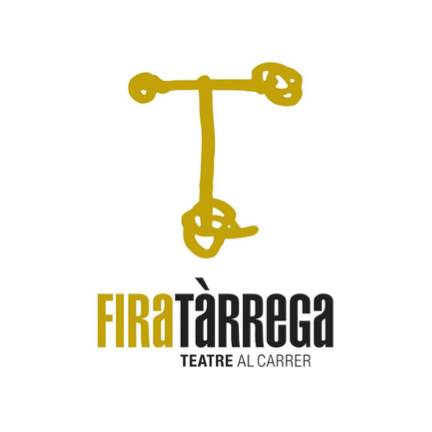 Regeneration of places
Regeneration of places
Interruptive gifts of [ The Frame ]
By Alina Stockinger (Eléctrico 28)

It has been almost 4 years now that the IN SITU project (UN)COMMON SPACES has started. At the same time, [ The Frame ], maybe Eléctrico 28’s most beloved project up to the moment, was born. [ The Frame ] is a show that does not want to be called a show but rather the beginning of an endless exercise in observation or an attempt to capture daily life passing by. Even though the audience is spatially separated from this life they observe through a frame created by the walls of two buildings, they strongly connect to the people inside of this frame, wondering about the nature of human existence in its manifold shapes and shades.
Roland Schwarz from an Austrian newspaper described it as "a production that carves the special nucleus out of the general. Sitting. Walking. Looking. Much more is not needed and still one can be sure to know many strangers better than before. And at the same time, oneself.
Daniela, Josep, Jordi, Claudia and myself have travelled to many European cities and towns with [ The Frame ]. The place chosen for it to happen is appropriately called “the main actor” by my colleague Josep because it does not only determine the scenography of the whole piece but also the social context of passers-by as well as their spontaneous performative actions. The open structure of the piece allows the idiosyncrasy of each place to shine and breathe inside. It wants to softly hug the place and its people, no matter whether it is Barcelona’s Raval, Milano’s Chinatown or the Boulevard of Aix-en-Provence.
Its nature is to never be the same, but with time we have realised that there is something that sustains it strongly, apart from the dramaturgy. Our scaffolding is probably the way we relate to the people on the streets. The performers of Eléctrico 28 do not only function as a focus but as a channel of connection between the ticketed audience and the passers-by. It might sound very cheesy, but I will say it anyway…this “channelling” is based on the principle of love: to love and to be loved. And falling in love with strangers is our speciality. |  © SIRF Festival (Stockton/UK) |
If we had to write a manual about our way of intervening it would start with the attempt to establish a connection with a person by meeting each other’s eyes and offering a simple proposal of whatever kind. The second step would be to understand if the person wants to engage, be left alone or if they are somewhere in the middle.
We frequently decide to take the risk of rejection, accepting it as a part of all the options of reaction. It is extremely important to us to treat people’s limits without ever judging them. We are not interested in the kind of humour that makes fun of others. But we do love to provoke laughter and strong images with people that are willing to play with us, celebrating the rhythms of humour and the freedom-potential of interventionist street theatre. We also enjoy the little reactions of people suddenly understanding that there is something happening in that shared space.
The way they suddenly modify their walking, their tempo, their gestures when realising that there is an audience watching them.
"And people react, everybody in their own fashion; some are startled, others enjoy the sudden attention"
Roland Schwarz, Kronen Zeitung
 © Jonay PMatos (Braga/Portugal) | It was Seth Honnor from the company Kaleider who described Eléctrico 28’s way of intervening as providing people with interruptive gifts. I found that expression very beautiful and working into both directions because many times it is the people on the streets that have given interruptive gifts to us. Maybe because they feel that the norms and rules of a place are somehow suspended in the framework of the performance, they allow themselves to transgress social limits, stepping out of the place’s dominant dynamics to make something different, a little act of liberation, a little comment on the state of things or themselves in the world. There have been people who have given such interruptive gifts to us all over the places we have visited, and we would like to thank them. It is these gifts that still make us want to perform this piece after four years of intense touring. |
And we want to share some of them here…
| In Alès, we were sharing the space with a houseless man. Actually, the man’s home was the place where we performed. He was watching each of the four performances with the headphones we had given to him from a little fountain inside of the place that became our stage. He was invisible to the rest of the audience because the fountain covered him but he was in the first row for us. And he watched carefully and was somehow moved to tears every time. At our departure, he thanked us and we thanked him. | In Igualada, a woman with a big cubic backpack on a bike, who was evidently working for a transportation service, decided to stop in the middle of the delivery to lie down on the street with us. We lay there for a while with the signs AND IF WE LIE DOWN HERE in our hands, watching the sky. | |
We also lay in the middle of a big street in Vilnius. Again, a person decided to join us. And then another person. And another. Six people stretched out on the asphalt, with their hearts beating, feeling the power of their action under the careful custody of the eyes of the audience. |  © Saulius Žiūra for SPOT Festival (Vilnius/Lithuania) | |
| In Stockton, a woman spun around in her wheelchair, laughing and pirouetting for the applauding audience as we held the signs AND IF WE TURN AROUND HERE. | In Viladecans, a baby crawled towards us to lay down next to us. | |
In Igualada, a whole school class of about 30 kids started jumping as we showed them the signs AND IF WE JUMP HERE. A contagion happened and suddenly everybody in the streets was jumping and laughing. We felt the ground trembling, or maybe our guts. | In Figueres we performed in the framework of a dance festival. A very poor and very athletic man spent the whole of the performance stretching first his right leg and then his left leg by putting it on top of a public dustbin. It swung from one side to the other as he was using it as a ballet bar. He became the dancer who never left the stage. | In Tàrrega and Guimarães, two men stopped their cars, opened the drivers’ doors and got out to dance tango with us. Their cars patiently waited for them to return and we left the Frame together with the cars of our dancing partners. |
 © Jonay PMatos (Guimarães/Portugal) © Jonay PMatos (Guimarães/Portugal) | ||
 © Saulius Žiūra for SPOT Festival (Vilnius/Lithuania) | ||
In England we received some very special surprises; | We also had a woman singing “Gracias a la vida” by Violeta Parra in front of La Sagrada Familia.We also had a woman singing “Gracias a la vida” by Violeta Parra in front of La Sagrada Familia. | In Prague, a group of tourists from South Korea decided to stop and sing their anthem when we showed them the signs AND IF WE SING HERE. |
 © Jonay PMatos (Barcelos/Portugal) | ||
| In Vilnius, Jordi was offered a condom. In Igualada, a man took off all his clothes on a dazzling cold and windy day, with great serenity, after reading AND IF WE UNDRESS HERE. | In Vila-real and Valladolid, three women flirted with Josep after he had asked them “What are you doing?”. In Vila-real, he was asked for a date and in Valladolid, two elderly ladies complimented his good looks for all the audience to hear. | |
 © TAC Valladolid (Spain) |  © Nikola Milatovic for La Strada (Graz/Austria) | |
| The second question we ask the passers-by is “How do you feel?” A lady in Aix-en-Provence answered: “Life is beautiful…in Aix-en-Provence!”. Another one said, “I feel like a dizzy duck in a lake” and another, “I feel in full possession of myself.” | In Prague, a man answered, “I feel very good. It’s nice what you are doing here.” | In Milano, a woman hugged us afterwards and half crying, she said, “Bello, bello, bellíssimo, la poética di La Strada di Fellini”. |
| And in Barcelona, we had a Buddhist fan who came to see various gigs in various districts. He was convinced that what we were doing was meditation in everyday life and that this is what people need. | ||
We feel more than lucky to have met all these (un)common people in all these (un)common places.
And, of course, Georges Perec.

